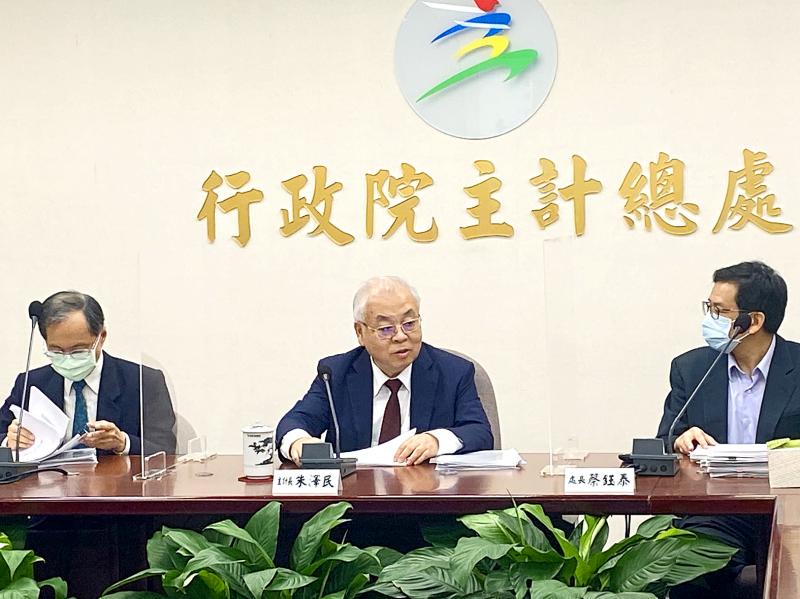Taiwan’s economy last quarter grew 3.33 percent, beating the government forecast of 2.01 percent, as demand for devices used in 5G equipment, as well as work-from-home and remote-learning trends, proved stronger than expected, the Directorate-General of Budget, Accounting and Statistics (DGBAS) said yesterday.
It was the best performance in nine quarters, reversing a downward trend in the second quarter, thanks to robust exports and soft imports that allowed external demand to more than offset languid private consumption, the agency said.
“Strong exports accounted for the economic showing that was better than expected” and might boost full-year growth to 1.9 percent from 1.56 percent in the DGBAS’ last forecast, national income section official Wu Pei-shuan (吳佩璇) told a media briefing in Taipei.

Photo: Clare Cheng, Taipei Times
The agency is to issue its formal update on Nov. 27 after a committee meeting, she said.
Exports of electronic components in the third quarter surged 20.39 percent year-on-year, while shipments of information and communications technology products soared 20.64 percent, Wu said.
The COVID-19 pandemic has caused disruptions at workplaces, schools and recreational facilities around the world, but has created unprecedented demand for tablets, notebook computers, TVs, servers, data centers, and other technology products and solutions necessary to maintain a low-contact economy.
Restrictions imposed by Washington on China’s Huawei Technologies Co (華為) prompted the Shenzhen-based technology titan to stockpile inventory ahead of the Sept. 15 deadline and increased business at its local suppliers.
Against that backdrop, net external demand contributed 3.2 percentage points to third-quarter growth, indicating little help from the domestic front, the report said.
Private investment increased a mild 2.04 percent, while government spending increased 3.2 percent, together adding 0.91 percentage points to the growth, it said.
Government agencies have commissioned public works ahead of schedule to shore up the economy, Wu said.
Consumer spending stayed in negative territory with a 1.51 percent retreat, although a boom in domestic travel significantly eased the drop in the critical GDP component, the report said.
Outbound travel shrank 97.8 percent, similar to a 98.94 percent slump in the second quarter, Wu said.
Domestic airline revenue declined 86.89 percent, while passengers on public transportation shrank 10 percent, it said.
However, retail businesses and restaurants saw a recovery of 4.57 percent and 0.85 percent respectively, partly on the back of the Triple Stimulus Voucher Program, Wu said, but added that this effect was difficult to quantify.

NATIONAL SECURITY THREAT: An official said that Guan Guan’s comments had gone beyond the threshold of free speech, as she advocated for the destruction of the ROC China-born media influencer Guan Guan’s (關關) residency permit has been revoked for repeatedly posting pro-China content that threatens national security, the National Immigration Agency said yesterday. Guan Guan has said many controversial things in her videos posted to Douyin (抖音), including “the red flag will soon be painted all over Taiwan” and “Taiwan is an inseparable part of China,” while expressing hope for expedited “reunification.” The agency received multiple reports alleging that Guan Guan had advocated for armed reunification last year. After investigating, the agency last month issued a notice requiring her to appear and account for her actions. Guan Guan appeared as required,

A Vietnamese migrant worker yesterday won NT$12 million (US$379,627) on a Lunar New Year scratch card in Kaohsiung as part of Taiwan Lottery Co’s (台灣彩券) “NT$12 Million Grand Fortune” (1200萬大吉利) game. The man was the first top-prize winner of the new game launched on Jan. 6 to mark the Lunar New Year. Three Vietnamese migrant workers visited a Taiwan Lottery shop on Xinyue Street in Kaohsiung’s Gangshan District (崗山), a store representative said. The player bought multiple tickets and, after winning nothing, held the final lottery ticket in one hand and rubbed the store’s statue of the Maitreya Buddha’s belly with the other,

‘NATO-PLUS’: ‘Our strategic partners in the Indo-Pacific are facing increasing aggression by the Chinese Communist Party,’ US Representative Rob Wittman said The US House of Representatives on Monday released its version of the Consolidated Appropriations Act, which includes US$1.15 billion to support security cooperation with Taiwan. The omnibus act, covering US$1.2 trillion of spending, allocates US$1 billion for the Taiwan Security Cooperation Initiative, as well as US$150 million for the replacement of defense articles and reimbursement of defense services provided to Taiwan. The fund allocations were based on the US National Defense Authorization Act for fiscal 2026 that was passed by the US Congress last month and authorized up to US$1 billion to the US Defense Security Cooperation Agency in support of the

CLASSIFIED BRIEFING: The ministry said the special budget focuses on building a comprehensive defense system and strengthening the domestic defense industry The Ministry of National Defense yesterday released information on seven categories of weapons systems to be procured under a stalled NT$1.25 trillion (US$39.57 billion) special defense budget, including precision artillery, long-range missiles, air defense anti-tank missiles and more than 200,000 uncrewed aerial vehicles (UAVs). The Executive Yuan approved a draft version of the budget on Nov. 27 last year and submitted it to the legislature for review. The legislature’s Foreign Affairs and National Defense Committee yesterday invited Minister of National Defense Wellington Koo (顧立雄) to deliver a classified briefing and answer questions at a closed-door session. Koo said he hoped to provide lawmakers